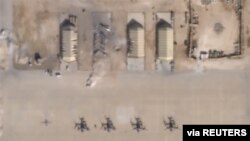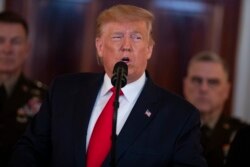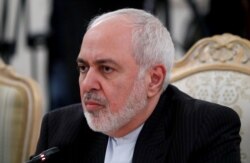Following Iran's missile attacks on U.S. forces in Iraq Tuesday and President Donald Trump's speech Wednesday, experts say they believe the United States and Iran are unlikely to escalate the situation after the death of Iran's powerful commander Qassem Soleimani in a U.S. airstrike last week.
In response to Soleimani's killing, Iran's Islamic Revolutionary Guard Corps (IRGC) claimed responsibility for launching more than a dozen ballistic missiles targeting two Iraqi air bases that house U.S. forces.
Soleimani was considered Iran's most powerful figure after Supreme Leader Ayatollah Ali Khamenei. Under his command, the IRGC-Quds Forces unit successfully expanded Iran's influence in the so-called Shiite Crescent — a term referring to a crescent-shaped region in the Middle East where Shiite communities reside.
Following Tuesday's Iranian attack, the country's Foreign Minister Javad Zarif said that his country carried out the strike with "proportionate measures in self-defense."
"We do not seek escalation or war, but will defend ourselves against any aggression," he said in a tweet.
No Americans were killed or wounded in the attack, U.S. officials confirmed, and the material damage at the targeted sites was minimal.
‘Iran standing down'
In a speech at the White House on Wednesday, Trump said that after assessing the Iranian attack, "Iran appears to be standing down."
Some experts say that Trump's remarks gave a sense of whether the U.S. would respond to the Iranian missile attack.
"I think what the president's remarks underscored is what we've heard all along from him, which is that he is not interested in getting into any sort of open-ended military conflict," said Ambassador Barbara Leaf, director of the Geduld Program on Arab Politics at the Washington Institute for Near East Policy.
But Leaf, who has served as a U.S. ambassador to the United Arab Emirates, told VOA that under such tense conditions, adversaries can misread each other's strategic intent.
Trump's words also offered a different tone at this time of high tensions between Washington and Tehran, other experts said.
"Trump's speech shows that the U.S. administration has decided to exhibit restraint for now," said Kaleigh Thomas, a Middle East researcher at the Center for a New American Security in Washington.
She told VOA that Iran's airstrike fit with the "fine line" Iran was trying to walk.
"It was highly visible and attributable, thus satisfying its need for a demonstrable retaliation. It resulted in no American loss of life, thus preventing immediate further kinetic escalation from the United States," Thomas said. "In doing both those things created space for Iran to think more strategically about how it will manage escalation with the United States moving forward."
William Wechsler, director of Middle East Programs at the Atlantic Council in Washington, offered a similar view.
"From the United States' point of view, it would mean that we would undertake no offensive actions against Iran or their proxies again for the time being, and we would limit the kind of rhetoric that could potentially be escalatory in and of itself," he told VOA Persian. "So, if both sides can follow that path, then there's a real potential of de-escalating at least tactically away from the immediate situation that we're in."
‘Face-saving'
Mohsen Behzad Karimi, a Britain-based Iran analyst, believes the nature of the missile attack and Zarif's subsequent comments were signals from Tehran to "move toward de-escalation."
"The attack was just an orchestrated attempt, as the signs indicate, for face-saving (the) Iranian regime, and for domestic consumption," Karimi told VOA.
Hossein Aghaie Joobani, another Iranian affairs analyst based in Turkey, said the nature of the IRGC strikes indicates that Iran took action cautiously.
"By and large, the scope and limits of the IRGC missile strikes illustrate the fact that Iran might have been perfectly aware that if American soldiers' lives were to be taken as a result of an uncalculated and risky operation, the situation will spin out of control on the part of both Tehran and Washington. Both Washington and Tehran don't want further military escalation, and they might be satisfied with the status quo and even further de-escalation," he told VOA.
What it appears to be now, experts said, is that Iran chose not to conduct any attacks that would lead to American causalities.
"If I was in the Trump administration, I would choose to interpret it, and I would then test to see whether or not this action and the words that (Iranians) say — they want to de-escalate — if Iranian behavior in the next days and weeks follows that same path," analyst Wechsler noted.
Additional sanctions
Despite signs of de-escalation, the Trump administration seems determined to continue its "maximum pressure policy" against Tehran for its destabilizing efforts in the region, including supporting proxy militant groups in various countries.
"As we continue to evaluate options in response to Iranian aggression, the United States will immediately impose additional punishing economic sanctions on the Iranian regime. These powerful sanctions will remain until Iran changes its behavior," Trump said during his Wednesday remarks.
Since withdrawing from the Iranian nuclear deal in May 2018, the Trump administration has imposed dozens of economic sanctions on Tehran. In April 2019, the U.S. government designated the IRGC a terrorist organization.
Effects
While the U.S. government insists these sanctions have crippled the Iranian government's financing and deprived Tehran of substantial oil revenue, Thomas believes that the new "sanctions will likely have little material effect on Iran's economy."
Leaf said such sanctions are imposed by the administration with several objectives in mind.
One of them "is to dry up resources for Iran to pursue the destructive regional policies that it has pursued across Lebanon, Syria, Iraq, Yemen and Bahrain," she said. "Secondarily, to drive Iran back to the negotiating table on not just the nuclear issues, but ballistic missiles and the regional activities. So, in both instances, I would say the sanctions have not produced results."
Last week Iranian President Hassan Rouhani said that renewed U.S. sanctions on Iran have cost the country $200 billion in foreign exchange income and investment.
VOA's Jesusemen Oni and Katherine Ahn contributed to this story from Washington.









